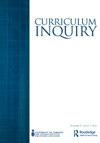The skilled teacher: A Heideggerian approach to teacher practical knowledge
IF 1.6
3区 教育学
Q2 EDUCATION & EDUCATIONAL RESEARCH
引用次数: 2
Abstract
Abstract The concept of teacher practical knowledge (PK), with its emphasis on the intuitive and situated nature of teaching practice, has provided a compelling approach to understanding what underlies teaching practice. However, much of the literature around PK focuses on teacher reflections on their practice and leaves unexplored the question of how a teaching situation elicits particular practices from teachers. Moreover, there is a tendency to focus on individual PK, and this means that the social dimension, and particularly the socially normative element, of teaching practice is perhaps underappreciated. This article develops what I call the skilled teacher approach (STA) to teaching practice, which shifts the focus from teachers’ individual cognitions about practice to what teachers directly perceive as possible in their fundamentally social teaching environment. This approach is rooted in Heidegger’s phenomenology but also draws substantially on ecological psychology literature and argues that what teachers do in practice is largely a product of the affordances they directly perceive in their practice environment. It also argues that much of the landscape of affordances that a teacher perceives is socially constructed. Consequently, a significant part of PK relates to a sensitivity to the socially given affordances and knowing intuitively “what one does” as a teacher. This approach offers a different, yet complementary, understanding of teaching practice and suggests new ways of engendering positive change in practice.熟练的教师:教师实践知识的海德格尔方法
教师实践知识(PK)的概念强调教学实践的直觉性和情境性,为理解教学实践的基础提供了一种令人信服的方法。然而,关于PK的许多文献都侧重于教师对其实践的反思,而没有探讨教学情境如何引发教师的特定实践的问题。此外,有一种倾向于关注个人PK,这意味着教学实践的社会维度,特别是社会规范因素可能被低估了。本文发展了我所谓的教学实践的技能教师方法(STA),它将重点从教师对实践的个人认知转移到教师在其基本的社会教学环境中直接感知到的可能。这种方法植根于海德格尔的现象学,但也大量借鉴了生态心理学文献,并认为教师在实践中的行为在很大程度上是他们在实践环境中直接感知到的能力的产物。它还认为,教师所感知到的许多启示都是社会建构的。因此,PK的一个重要部分与对社会给予的支持的敏感性以及作为教师直观地知道“自己在做什么”有关。这种方法提供了一种不同的,但互补的,对教学实践的理解,并提出了在实践中产生积极变化的新方法。
本文章由计算机程序翻译,如有差异,请以英文原文为准。
求助全文
约1分钟内获得全文
求助全文
来源期刊

Curriculum Inquiry
EDUCATION & EDUCATIONAL RESEARCH-
CiteScore
3.10
自引率
17.60%
发文量
37
期刊介绍:
Curriculum Inquiry is dedicated to the study of educational research, development, evaluation, and theory. This leading international journal brings together influential academics and researchers from a variety of disciplines around the world to provide expert commentary and lively debate. Articles explore important ideas, issues, trends, and problems in education, and each issue also includes provocative and critically analytical editorials covering topics such as curriculum development, educational policy, and teacher education.
 求助内容:
求助内容: 应助结果提醒方式:
应助结果提醒方式:


